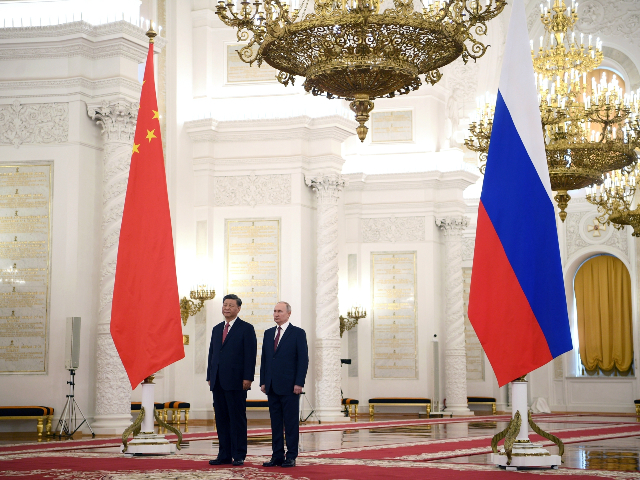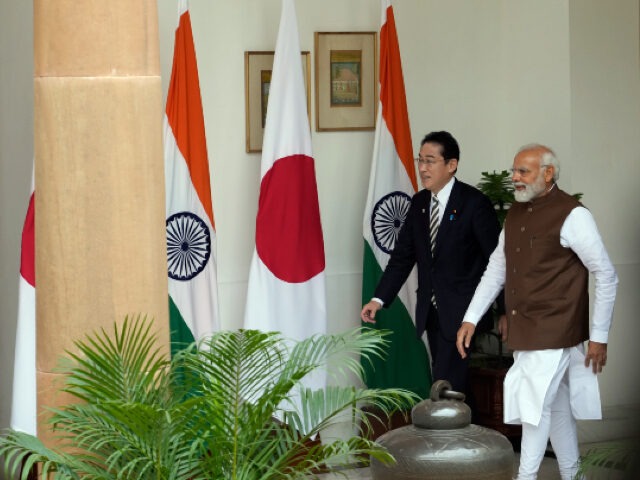China’s regime-controlled news outlet condemned conservative Japanese Prime Minister Kishida Fumio on Monday for daring to visit India while China’s dictator Xi Jinping began a trip to Russia, accusing Kishida of pursuing ambitions “too big for his boots” and lamenting that Kishida and Indian Prime Minister Narendra Modi were siphoning media away from Moscow.
Kishida landed in New Delhi on Sunday, meeting with Modi and engaging in extensive exchanges meant to promote Japan’s economic involvement in India as well as planning further geopolitical cooperation.
On Monday, Kishida delivered a speech in India laying out Japan’s vision for the “Free and Open Indo-Pacific,” a concept spearheaded by late former Japanese Prime Minister Abe Shinzo meant to contain China’s violent colonialist conquests in the South China Sea.
Kishida did not mention China once in his speech – though he mentioned Russia’s full-scale invasion of Ukraine on multiple occasions – but stated that Japan’s goal in cooperating with nations such as India was to contain unspecified aggressive powers attempting to erode the sovereignty of the smallest nations in the region.
China illegally claims nearly the entirety of the South China Sea, including territory belonging to the nations of Taiwan, Brunei, Malaysia, Vietnam, and the Philippines. Despite losing a territorial dispute case before the Permanent Court of Arbitration at the Hague against the Philippines in 2016, China has continued to build illegal artificial islands and military facilities in waters belonging to the Philippines and Vietnam, with minimal pushback.

Russian President Vladimir Putin, right, and Chinese President Xi Jinping attend an official welcome ceremony at The Grand Kremlin Palace, in Moscow, Russia, Tuesday, March 21, 2023. (Alexey Maishev, Sputnik, Kremlin Pool Photo via AP)
The Chinese government newspapers Global Times and China Daily accused Kishida on Monday of using the “Free and Open Indo-Pacific” policy to ingratiate himself with America and attempt to contain Chinese influence. China Daily condemned Kishida and his allies in Japanese politics for supporting increases in defense spending and the potential for Japan to maintain an army. The Japanese constitution, written in the aftermath of World War II, prohibits the country from maintaining armed forces beyond a limited “self-defense” force.
“Given what the militarist Japan did to its neighbors before and during World War II, Japan’s regaining of military capability far beyond the needs of its self-defense undoubtedly poses a threat to regional peace and stability,” China Daily warned. “There is nothing wrong with Japan harboring the ambition to be a bigger player on the world stage. But that does not mean it needs to expand its military capability for that purpose.”
Kishida did not discuss creating an official Japanese military force during his visit to India.
China Daily nonetheless accused Japan of becoming the “leading source of regional instability” by allegedly seeking to “act as a gun of the US in its strategy to contain the rise of China and thus strengthen its own influence in the region, and also to justify its moves to expand its military capability.”
“What the Kishida government is doing only points to the fact that it is doing nothing to promote peace and development in the region. Instead, it is acting as a bridgehead for forces from other parts of the world, including NATO, to interfere in the affairs of Asia,” the state propaganda outlet harped.
The Global Times, a separate government publication, mocked Kishida as being insufficiently influential to achieve his goals in India, rather than condemning him as a violent rogue actor.
“Japan makes no secret of its attempt to push bloc-confrontation politics and zero-sum games during the tour,” the Global Times asserted, but added that Kishida’s “ambitious geopolitical dream” was “too big for his boots.”
“[I]f Japan expects more countries to agree with or even join the Western stance in dealing with China and Russia, its ambition is simply too big and unrealistic,” the newspaper concluded in a staff editorial.
WATCH: Blinken–China Considering Providing ‘Lethal Support’ to Russia for Ukraine War
The state media responses followed a preemptive condemnation of Kishida’s travels by Chinese Foreign Ministry spokesman Wang Wenbin on Friday, when he was asked to respond to the news that Kishida would visit India this week.
“The Asia-Pacific is not an arena for geopolitical games. Cooperation between certain countries should be conducive to enhancing mutual understanding and trust between regional countries and regional peace and stability, rather than target any third party or harm its interest,” Wang asserted. “Certain countries have been vocal about promoting ‘freedom and openness’ in what they called ‘Indo-Pacific,’ but they are in fact putting up a small circle featuring bloc confrontation.”
During remarks together on Monday, Modi and Kishida emphasized the fact that their countries would both host major events this year: India is hosting the G20 Summit, while Japan is hosting the G7. The leaders exchanged, and immediately accepted, invites to both events.
“In the last one year, PM Fumio Kishida and I have met several times and every time I’ve felt his positivity and commitment to the India-Japan bilateral relationship. His today’s visit will be beneficial to maintain this momentum,” Modi said in remarks alongside the Japanese leader.
In his extensive address regarding the Indo-Pacific on Monday, Kishida emphasized “respect for sovereignty and territorial integrity, the peaceful resolution of disputes and the non-use of force,” an apparent reference to Beijing’s South China Sea activities.
“Japan will strengthen coordination with the United States, Australia, the ROK, Canada, Europe and elsewhere. Of course, India is indispensable,” Kishida promised. “We will expand the networks among countries that share the vision, including ASEAN and the Pacific Island countries, the Middle East, Africa, Latin America and the Caribbean, and direct efforts in the spirit of co-creation.”

COMMENTS
Please let us know if you're having issues with commenting.